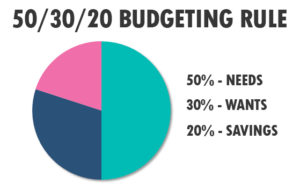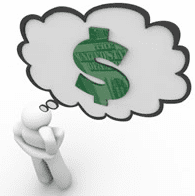 This is a general rule about spending – 50/30/20 rule. 50 percent of your take home income should go towards your needs (such as food, housing, childcare, minimum debt repayment etc.), 30% towards your wants (dining out, travel, clothing, subscriptions, memberships) and the remaining 20% to your savings / debt repayment (emergency funds, retirement, additional payments towards debt). Nerd Wallet can tell you the amount for each category 50/30/20 Budget Calculator – NerdWallet. #JillRussoFoster #FinancialLiteracyMonth
This is a general rule about spending – 50/30/20 rule. 50 percent of your take home income should go towards your needs (such as food, housing, childcare, minimum debt repayment etc.), 30% towards your wants (dining out, travel, clothing, subscriptions, memberships) and the remaining 20% to your savings / debt repayment (emergency funds, retirement, additional payments towards debt). Nerd Wallet can tell you the amount for each category 50/30/20 Budget Calculator – NerdWallet. #JillRussoFoster #FinancialLiteracyMonth
Financial Literacy Month #16
 Like Capital One says, What’s in your wallet? Could you tell me everything that is in your wallet right now? If you were to lose your wallet today, how would you know what to cancel and replace. Clean out your wallet and carry only the minimum you require. You should never carry your social security card, your PIN numbers / passwords, blank check(s), passport unless you need to use them that day. Identity theft is on the rise. Protect yourself. #JillRussoFoster #FinancialLiteracyMonth
Like Capital One says, What’s in your wallet? Could you tell me everything that is in your wallet right now? If you were to lose your wallet today, how would you know what to cancel and replace. Clean out your wallet and carry only the minimum you require. You should never carry your social security card, your PIN numbers / passwords, blank check(s), passport unless you need to use them that day. Identity theft is on the rise. Protect yourself. #JillRussoFoster #FinancialLiteracyMonth
Financial Literacy Month #14
 Do you feel like you are spending too much? Have you considered an all-cash month? Or how about a no spending month? Here are two great books to read to give you some ideas Not Buying It: My Year Without Shopping by Judith Levine or The Complete Tightwad Gazette by Amy Dacyczyn. #JillRussoFoster #FinancialLiteracyMonth
Do you feel like you are spending too much? Have you considered an all-cash month? Or how about a no spending month? Here are two great books to read to give you some ideas Not Buying It: My Year Without Shopping by Judith Levine or The Complete Tightwad Gazette by Amy Dacyczyn. #JillRussoFoster #FinancialLiteracyMonth
Financial Literacy Month #13
 Have you cut the cord or do you want to with your TV provider or streaming service? When was the last time you used your local library? With your library card you can download the Hoopla app and stream movies at home for free. #JillRussoFoster #FinancialLiteracyMonth
Have you cut the cord or do you want to with your TV provider or streaming service? When was the last time you used your local library? With your library card you can download the Hoopla app and stream movies at home for free. #JillRussoFoster #FinancialLiteracyMonth
Financial Literacy Month #11
 Now that you are not paying fees on your bank account, are you earning interest on your money? There are some amazing accounts (both checking and savings) with great interest rates. Shop around for the best rate without fees. #JillRussoFoster #FinancialLiteracyMonth
Now that you are not paying fees on your bank account, are you earning interest on your money? There are some amazing accounts (both checking and savings) with great interest rates. Shop around for the best rate without fees. #JillRussoFoster #FinancialLiteracyMonth
Financial Literacy Month #10
 Are you paying fees to your bank? You should be able to bank without fees. Some banks waive the fees with a minimum balance or direct deposit. Paying a monthly fee to have a bank account is a waste of your hard-earned money. #JillRussoFoster #FinancialLiteracyMonth
Are you paying fees to your bank? You should be able to bank without fees. Some banks waive the fees with a minimum balance or direct deposit. Paying a monthly fee to have a bank account is a waste of your hard-earned money. #JillRussoFoster #FinancialLiteracyMonth
Financial Literacy Month #8
 While thinking about saving money, what can you eliminate from your life that would save you money? Can you bring your choice of beverage from home versus buying? Can you stop buying bottled beverages? Do you bring your lunch with you from home? We have eliminated the trash removal / recycle bill by taking it ourselves. We went from $75/month to $25/year. How can you save? #JillRussoFoster #FinancialLiteracyMonth
While thinking about saving money, what can you eliminate from your life that would save you money? Can you bring your choice of beverage from home versus buying? Can you stop buying bottled beverages? Do you bring your lunch with you from home? We have eliminated the trash removal / recycle bill by taking it ourselves. We went from $75/month to $25/year. How can you save? #JillRussoFoster #FinancialLiteracyMonth
Are you curious about when to start social security?

That’s a question on a lot of people’s minds. Should I take it early at 62 or at my full retirement age or wait until I am 70.
Well wouldn’t it be great if you had a crystal ball to get the right answer for you. Well, we don’t and you want to make the right decision for your situation.
Here is an article from the Motley Fool that could give you some information that may help you make a decision that’s right for you.
Save More for Financial Literacy Month

Emergency savings are for when your car breaks down. It’s for an unexpected medical expenses. It’s for covering your bills if you’re between jobs. It’s for unexpected home repairs. An emergency is something that must be taken care of right now or you won’t be able to get to work, have a place to live, or when you might have to choose between medical bills and utilities.
What it’s not: a savings account for things you think you need. No matter how much you think need to book a cruise, a nice vacation is a want. You will survive if you vacation at home with trips to the local beach. You will also survive without a smart phone, or cable TV, or a Kindle. You get the idea.
Once you have an emergency savings equal to one year of your expenses (yes, I said one year), then you can start saving for the fun things you want in life. Today, plan on how you are going to start saving for emergencies. Set up a regular savings amount from your pay that automatically goes to this account.
America Saves Week – Saving for Your Future
 I always hear that there is never any money leftover to save. I used to think that way too until I implemented an automatic savings plan where I pay myself first. Each pay period, I have money automatically taken from my check and put into my savings. It’s as easy as that!
I always hear that there is never any money leftover to save. I used to think that way too until I implemented an automatic savings plan where I pay myself first. Each pay period, I have money automatically taken from my check and put into my savings. It’s as easy as that!
Setting up automated savings puts money into your savings first – either having your employer split your paycheck into two accounts or doing this through your bank. Once you set it, it’s done. No more saying “I don’t have money to save”.
Start with a small amount and increase it yearly or when you receive an increase in pay. $5.00 a week will get you $260; $10 a week will get you $520.
Once you get this set up, you might want to think about the different types of savings you will need in your life. Everyone needs an emergency savings for unexpected expenses. In addition, start think about your goals that need funds – auto, children’s education, security deposit for an apartment, down payment for a home, retirement, travel plans and more. Set up a savings account for your specific goal and set up an automated amount so that you can reach your goal in your time frame.
It’s never too late to start saving for what you want. You can achieve it if you want to.
- 1
- 2
- 3
- …
- 11
- Next Page »